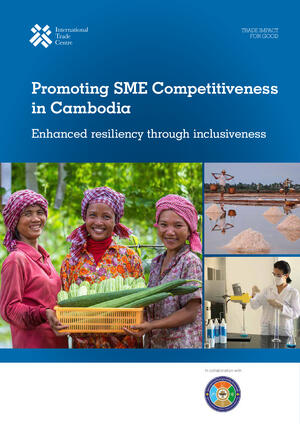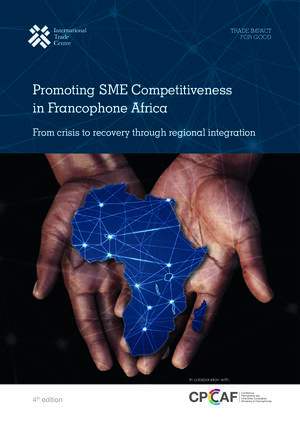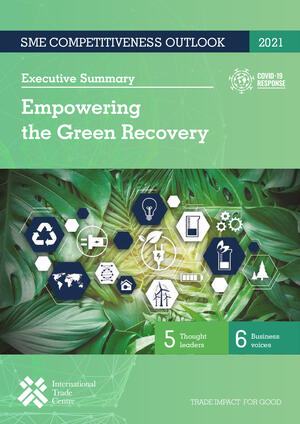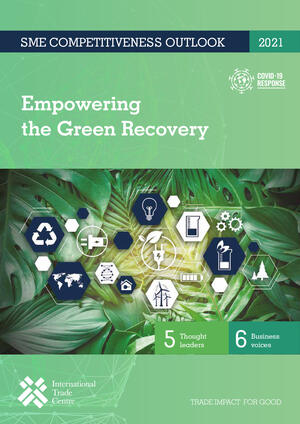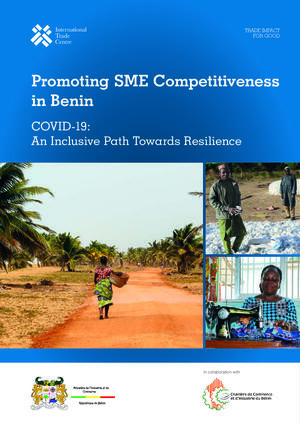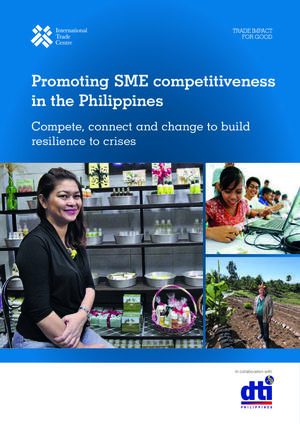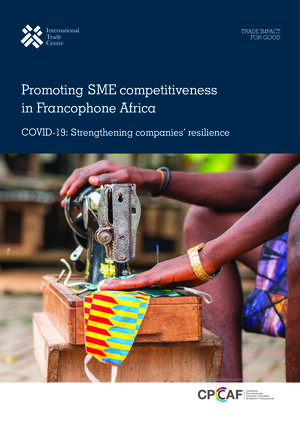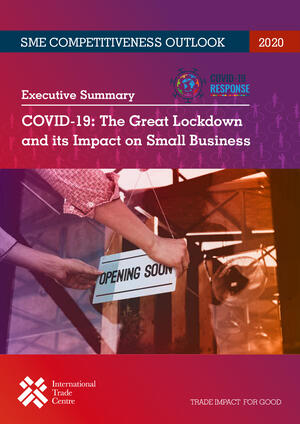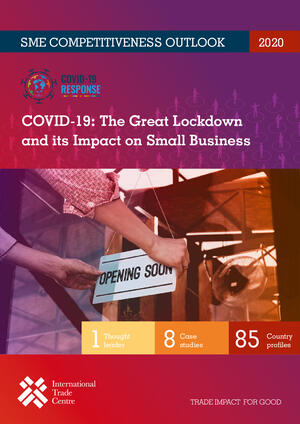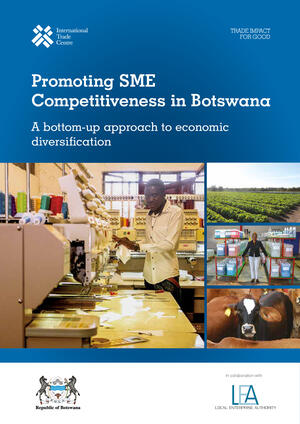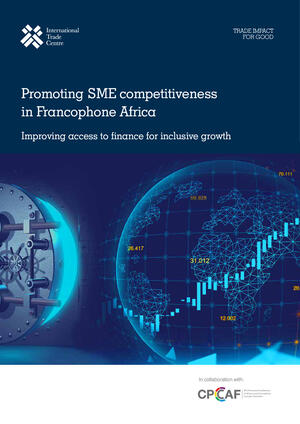
Research and data
Our business intelligence services provide decision makers at all levels with targeted data and analysis to support the competitiveness of small businesses.
Data and analyses for SME competitiveness
We offer three unique evidence-based sources of research and data that are critical to boosting the performance of small businesses in domestic and international markets.
Our SME Competitiveness Survey (SMECS) collects data in partnership with countries and provides deep dives into business data covering various geographic locations and topics, which then serve as the basis for our strategic approach and interventions around the world.
Our SME Competitiveness Outlook (SMECO): the annual flagship publication where we present all the research we have done over the course of the year. Decision makers can use the report to take the pulse of small businesses across the world, understand major trends affecting them and gain insights on opportunities and constraints they face.
Our working papers are academic reports that provide the methodology behind our findings published in the SME Competitiveness Outlook. The opinions expressed in the papers are those of the authors and do not necessarily represent those of the ITC, the United Nations or the World Trade Organization.
Our findings and recommendations are useful for:
-
Policymakers in passing or reforming policies to support small business competitiveness
-
Business support organizations in creating support services that better respond to the needs of small businesses
-
Small businesses in learning about export-related opportunities, and how to approach institutions and business partners for support
-
Investors in understanding the major issues affecting small businesses in a country, including ways to mitigate risks when considering investment opportunities
Competitiveness is the ability of a firm to design, produce and commercialize a good or service that meets market demand, while connecting with the business environment and earning returns in a sustainable way. The more competitive a firm, the more likely it is to export.
At ITC, competitiveness is translated into the ability of small businesses to:
-
Compete: How are operations run? How efficient are those processes, in terms of cost, time, quality and quantity? What is the business environment like?
-
Connect: How is information collected and used? How does information flow from the firm to the immediate business environment?
-
Change: How does a firm respond to – or anticipate – changing market forces? How does it innovate, by investing in human, intellectual and financial capital?
ITC’s SME Competitiveness Survey (SMECS) collects data disaggregated by gender and age of firm owner, sector of operation, geographical region and other factors. This helps paint a general picture of a country’s small businesses and provides insights on the key advantages and constraints of specific types of businesses.
The survey can be tailored to align to a country’s objectives, such as supporting youth entrepreneurship or increasing women’s participation in trade.
Once data are collected, interpreted and validated, findings can be published in a country-specific report, or used as input into an ITC working paper or the ITC annual flagship publication. Firm-specific information remains confidential.
ITC has supported partners to survey more than 18,000 companies in nearly 50 countries of differing income levels. We work with national partners, who take the lead, and tailor the surveys to specific country needs.
Survey results are published as part of the ITC promoting SME competitiveness series of reports.
- 2023: Promoting SME Competitiveness in Zimbabwe: Drive growth through business networks and technology
- 2023: SME Competitiveness in Francophone Africa 2023: Building resilience to climate change
- 2022: Promoting SME Competitiveness in Eswatini: Stronger business fundamentals for value-added exports
- 2022: Promoting SME Competitiveness in Colombia: Towards an inclusive and sustainable future
- 2022: Promoting SME Competitiveness in South Sudan: Targeted solutions for a resilient future
- 2022: SME Competitiveness in Francophone Africa 2022: Fostering digital transformation
- 2022: Promoting SME Competitiveness in Burkina Faso: Resilient foundations for post-COVID recovery
- 2022: Promoting SME Competitiveness in Cambodia: Enhanced resiliency through inclusiveness
-
2021: Promoting SME Competitiveness in Togo: A resilient foundation for transformative growth
-
2020: Promoting SME Competitiveness in Benin - COVID-19: An Inclusive Path Towards Resilience
-
2020: Promoting SME competitiveness in Francophone Africa - COVID-19: Strengthening companies' resilience
-
2018: Guide to Chinese private investment in Africa: Insights from SME competitiveness surveys
-
2018: Promoting SME Competitiveness in Francophone Africa: Standards open doors to trade
-
2018: Promoting SME Competitiveness in Africa: Data for de-risking investment
The SME Competitiveness Outlook is ITC’s flagship report, published annually since 2015. Each edition of the report provides an in-depth analysis on a topic related to the competitiveness of small businesses.
- SME Competitiveness Outlook 2023 - Small Businesses in Fragility: From Survival to Growth
- SME Competitiveness Outlook 2022 - Connected Services, Competitive Businesses
-
SME Competitiveness Outlook 2021 - Empowering the Green Recovery
-
SME Competitiveness Outlook 2020 - The Great Lockdown and its Impact on Small Business
-
SME Competitiveness Outlook 2019 - Big Money for Small Business
-
SME Competitiveness Outlook 2018 - Business Ecosystems for the Digital Age
-
SME Competitiveness Outlook 2017 - The Region: A Door to Global Trade
-
SME Competitiveness Outlook 2016 - Meeting the Standard for Trade
-
SME Competitiveness Outlook 2015 - Connect, Compete and Change for Inclusive Growth
For research in progress, ITC publishes working papers to elicit comments and further debate.
-
2020: International firms and COVID-19: evidence from a global survey
-
2019: Defining firm competitiveness: a multidimensional framework
-
2018: The impact of quality-related business trainings in Latin America
-
2018: What bang for the buck? Export promotion and the extensive margin of trade
-
2017: Do we need deeper trade agreements for GVCs or just a BIT?
-
2017: Extracting value in South-South and South-North value chains
-
2016: ITC assessment of the technology level of exports: methodology and analytical issues
-
2016: Technical regulations affect exporters’ performance: firm level evidence from developing countries
-
2016: How do NTMs affect countries’ participation in international value chains?
-
2016: Institutional design of voluntary sustainability standards systems: Evidence from a new database
-
2015: SMEs, trade and development : Africa, GCC countries, Latin America, South-east Asia, China, Ukraine, Tunisia




